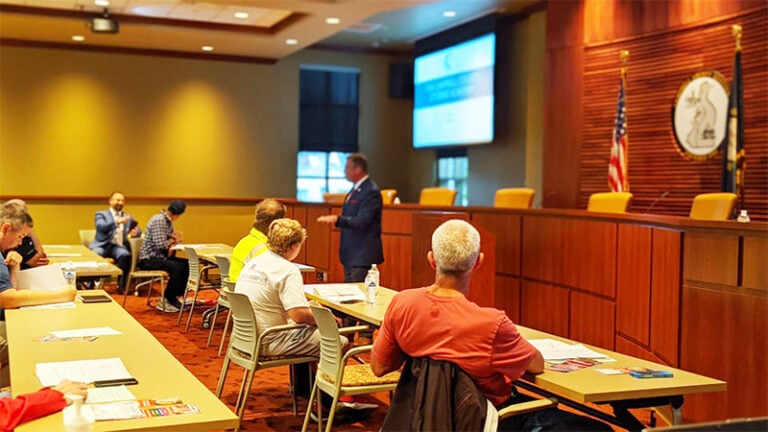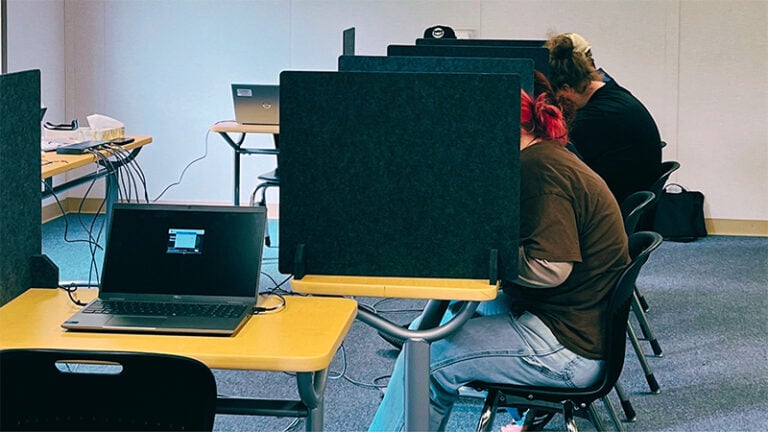By Tom Latek
Kentucky Today
Kentucky Supreme Court Chief Justice John Minton touched on ideas he’d like to implement during his annual State of the Judiciary address to the Interim Joint Judiciary Committee at the University of Louisville Brandeis School of Law on Friday.
One of the topics was reforming the civil justice system in the state. Minton told lawmakers state courts nationwide are facing a crisis due to the cost, delay and complexity of litigation, which is undermining public confidence in the civil justice system.
“While we have made great strides in court technology, we have failed to make courts more user-friendly in other ways,” Minton said. “Here in Kentucky and across the nation, we’re seeing a significant decline in our civil caseload and the near extinction of the civil jury trial. If we fail to change the way we operate, we run the risk of becoming obsolete – a risk that the legal profession must work to avoid.”

Minton named a Civil Justice Reform Commission to examine the issue, who has recommended development of a business courts pilot project.
“Business courts are designated sections, dockets or divisions of Circuit Court designed to hear complex commercial cases and business disputes,” said Minton. “These are not professional negligence or personal injury cases filed by an individual against a corporation or commercial entity. Rather, business courts focus solely on business versus business disputes.”
Minton said business courts are currently in 24 states and pilot programs are underway in five others.
“Their goals are to improve access to justice for all litigants by unclogging regular dockets and giving complex commercial cases the attention they need, improving court efficiency, and creating a more attractive forum for doing business.”
Another topic he addressed was pretrial justice reform, including Kentucky’s bail system. Minton said the court system is answering the call for change by taking part in the Pretrial Justice Institute’s 3DaysCount campaign, a national initiative to make the system safer, fairer and more effective, by reducing the number of people in jail without sacrificing public safety.
“The program is based on the premise that even three days in jail can leave many people less likely to appear in court and more likely to commit new crimes because of the stress incarceration places on jobs, housing and family connections,” Minton said. “Commonsense solutions can lead to better outcomes, enhanced public safety and more effective use of public resources.”
He says a group of 14 circuit and district judges are evaluating the current risk assessment tool and recommending ways to improve pretrial practices and court rules, adding the final determination on changes would be up to the General Assembly.
Minton also gave his response to a scathing State Auditor’s report in July on the Administrative Office of the Courts, announcing they have hired outside expertise to shore up internal controls.
“Deloitte is one of the largest companies in the world, with expertise in auditing, enterprise risk, taxes, finance, strategy and operations, human capital and technology services,” Minton told the committee.
“A team from Deloitte will be at the AOC for 12 weeks to develop an internal auditing function; document existing workflows related to travel reimbursements, inventory, county facility reimbursements, and budget processes; and make recommendations about additional internal controls and technology related to the documented workflows. We believe this is an important next step as we use the audit as a catalyst for change by strengthening the AOC’s financial and administrative operations and providing more transparency to the public.”
Minton concluded his remarks by saying, “When I started this job 10 years ago, I could hardly have imagined the challenges we would face. I’m grateful for the 404 justices, judges and circuit clerks and 3,800 court employees who have jumped on board when we have repeatedly called for change.”

















